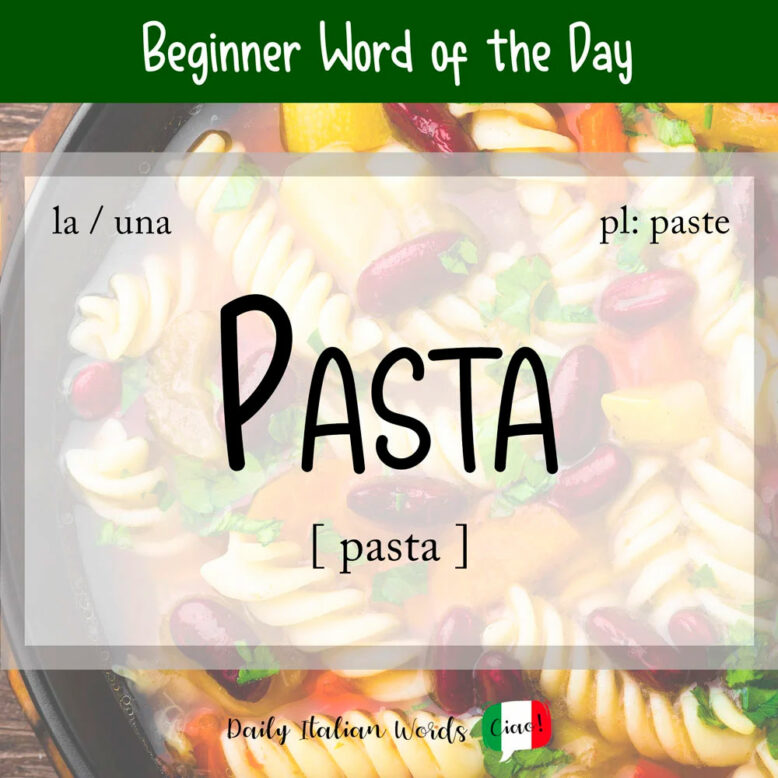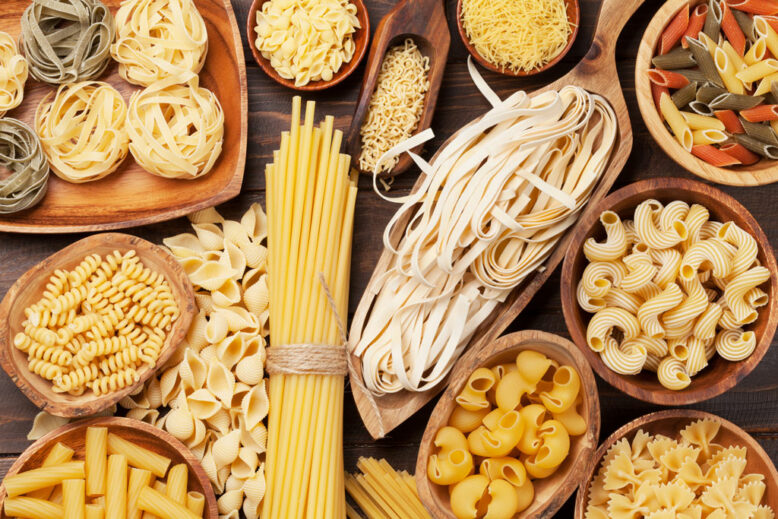The mere mention of the word “Italy” is likely to conjure up thoughts of all the gastronomic delights one can experience when visiting or living there, including wine (vino), pizza, gelato and of course, pasta!

In English and Italian, the mass noun pasta (feminine, plural: paste) refers to any dish consisting of dough made from durum wheat and water, stamped into various shapes and cooked in boiling water.
Alla sera mangio solo la pasta con un po’ di pane.
In the evening I only eat pasta with a bit of bread.
When talking about individual pasta noodles, it is common for Italians to use the specific name of the noodle, although you will also hear pezzo di pasta (piece of pasta) if many different kinds of noodles are involved or if the kind of noodle is unknown.
For example, one fusilli noodle would be called un fusillo whereas one spaghetti noodle would be called uno spaghetto. The dishes these noodles create are called fusilli and spaghetti respectively.
Below are a few more types of pasta with which you might be familiar:
tortellini
lasagne
tagliatelle
farfalle
penne
rigatoni
pappardelle
campanelle
rotini
acini di pepe
manicotti
gemelli
riccioli
rocchetti
ravioli
cavatappi
rotelle
radiatori
fettuccine
linguine
orecchiette
To say that you are putting pasta into a pot of boiling water, you can use one of two expressions: buttare la pasta or mettere giù la pasta. To drain the pasta translates as scolare la pasta.
Butta la pasta adesso e scolala fra 10 minuti.
Throw the pasta in now and drain it in 10 minutes.

A pasta dish can also be called pastasciutta, or pasta asciutta, with asciutta meaning dry. The reason for the name lies in the way you prepare the pasta: after cooking it in hot water, you drain it to get rid of the water and therefore make it asciutta, before adding the sauce or seasoning.
In Italian, the meaning of pasta extends beyond just the dish. It can also be used to refer to any kind of generic dough or paste. Even the verb to knead (impastare) contains the word pasta.
Ho cominciato ad impastare la pasta per la pizza.
I started kneading the dough for the pizza.
Pasta can also refer to pastries such as pasta filo (filo pastry), pasta sfoglia (flaky pastry) and pasta choux (choux pastry).
Given that pasta plays such an important role in Italian culture, it shouldn’t come as a surprise to discover that it has a figurative meaning as well. When used in reference to a person, it can mean temperament, character or stuff.
Io e te siamo fatti della stessa pasta.
We’re cut from the same cloth, the two of us.
(Lit: We have the same temperament/character.)
Idioms featuring the word ‘pasta’
Avere le mani in pasta
Literal translation: to have the hands in pasta
English meaning: to have a finger in the pie, to be involved
Vediamo di che pasta sei fatto!
Literal translation: Let’s see what pasta you’re made of!
English meaning: Let’s see what you’re made of!
Di tutt’altra pasta
Literal translation: of a completely different pasta
English meaning: a different kettle of fish, a different character
Heather Broster is a graduate with honours in linguistics from the University of Western Ontario. She is an aspiring polyglot, proficient in English and Italian, as well as Japanese, Welsh, and French to varying degrees of fluency. Originally from Toronto, Heather has resided in various countries, notably Italy for a period of six years. Her primary focus lies in the fields of language acquisition, education, and bilingual instruction.


